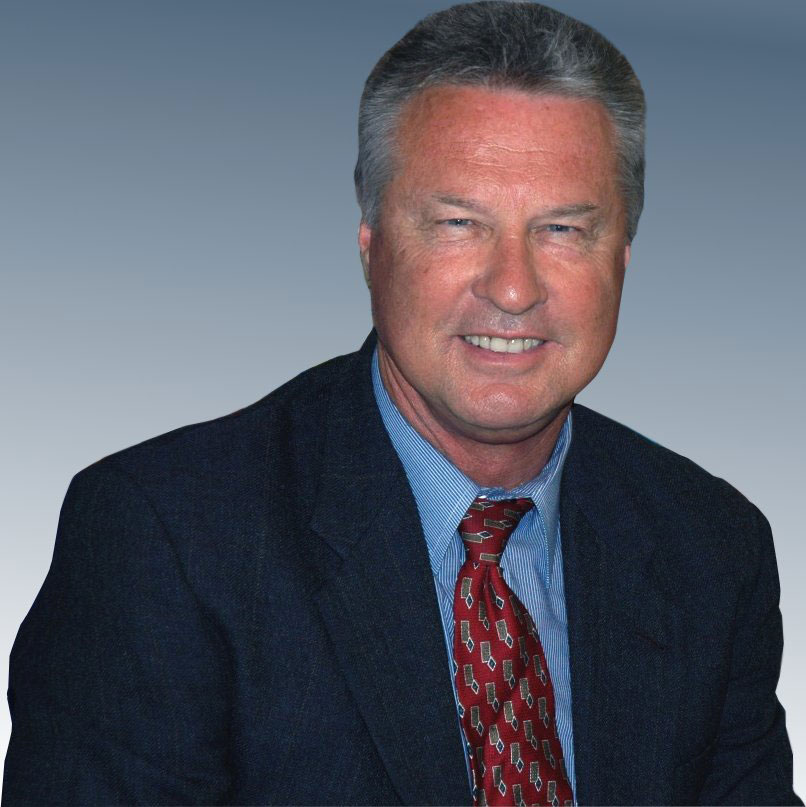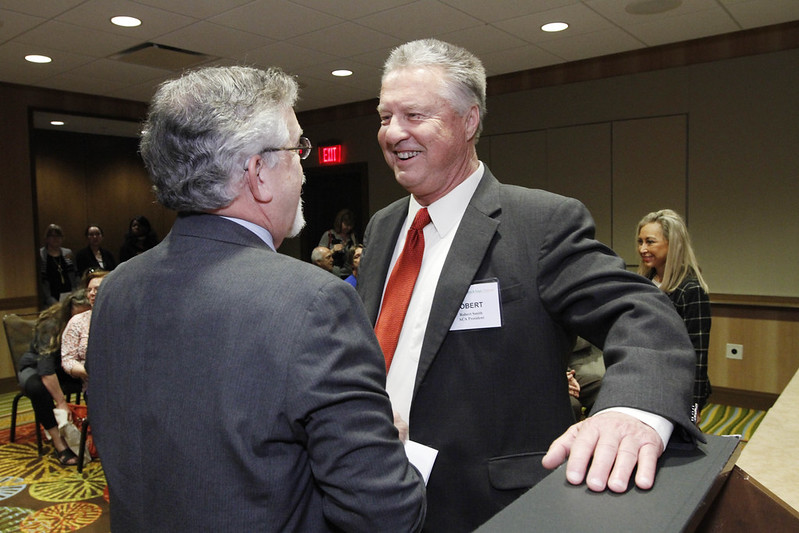In Memoriam: Robert L. Smith
By Richard S. Balkin

Robert L. Smith, the 63rd president of the American Counseling Association, passed away in his home on July 9 at the age of 77.
I first met Robert in 2008. He came up to me after a presentation at the ACA conference in Honolulu and said, “That was a good presentation. Have you ever thought about Texas A&M University-Corpus Christi?” At that time, I was a young, brash, tenured associate professor at Texas A&M University-Commerce. I did not know anything about Corpus Christi or even the esteemed figure in front of me. I simply answered arrogantly, “No, I have not.” Without batting an eye and with an expression of even further confidence, he said, “You should!”
A few months later at the 2008 Texas Counseling Association conference in Houston, Robert approached me again, opened my coat and placed an ad for a faculty position in my inner pocket. He was with his wife, Susan, and this time I was more receptive. I asked him, “Are there hurricanes?” He looked at Susan, and she replied, “We have not been hit in 30 years.”
During my interview for the faculty position, Robert promoted a vision of counseling, training, service and scholarship that spanned nationally and internationally and discussed how the counseling department fit in this vision. He ended by saying, “I can offer you a quality of wellness you will not experience anywhere in the country.” And he delivered on each and every promise.
Recruitment and vision were in Robert’s blood, and he promoted the counseling profession and others within the profession for decades. As a visionary leader in the counseling profession, Robert helped initiate development of the International Association of Marriage and Family Counselors (IAMFC), and he served as the first IAMFC president and executive director.
“I think many people do not have the vision that makes real changes, but he certainly did,” says Lynn Miller, an associate professor of counseling psychology at the University of British Columbia. Miller, one of Robert’s former students from the University of Colorado-Denver, fondly remembers him calling her one day after she got home from class and saying, “Hey, Miller! You like families, right?” After getting over her initial shock that Robert had called her and asked this question, she answered that she did like families. So, Robert asked her if she wanted to help him start a new association. She agreed, not realizing how much work they had ahead of them.
“One of the main tasks was to get enough signatures from the ACA membership at the time to agree to accept a new division. We had a huge stack of flyers that we brought to the annual ACA conference to seek signatures. He was so bummed out when he found a sizable stack of our flyers in the trash can,” Miller recalls. “People were not keen to see us succeed. But eventually we prevailed and soon were cited as the fastest growing professional association in the behavioral sciences. He also drafted the bylaws [and] the [IAMFC] code of ethics, designed membership pamphlets, had the idea to have a newsletter, conceived of the two-year leadership structure and pretty much everything else we needed to become a division.”
“I found Robert to be a person who was a strong advocate for counselors generally and for IAMFC and ACA specifically,” says Loretta Bradley, an ACA fellow and former ACA president. “IAMFC and ACA won’t be the same without Robert.”
Robert and Don W. Locke, who is also an ACA fellow and former ACA president, co-wrote the original CACREP accreditation standards for marriage and family counseling. They worked together for 40 years and served as each other’s parliamentarians during their terms as ACA president.
“Robert was never without dedication to our counseling profession and a desire to push for quality, genuineness and a true sense of caring,” Locke says. “He could also ‘talk and talk’ and never was without something to add to a discussion. Robert truly cared about his students, and there are many who are now teaching and counseling all over the country. He was a good writer and has left the profession with strong guidance for how to be as good as we can be. I can hear him saying, ‘Locke, think outside the box; you can do better than that!’”
“Robert was one of a kind, and our profession and ACA are better because he was willing to share himself with us,” Locke adds.
Robert was also a past president of the National Career Development Association. He achieved the highest accolades through his scholarship and service to the profession. His academic career spanned more than 55 years, during which time he led departments at Texas A&M University-Commerce, University of Colorado-Denver and Texas A&M University-Corpus Christi.
Throughout his career as a counselor educator, Robert had a tremendous impact on students and counseling professionals. He developed the counselor education doctoral program at Texas A&M University-Corpus Christi, and because of his leadership, more than 100 students have earned a doctorate in counselor education, with numerous graduates employed as university faculty members throughout the United States and abroad.
Robert also promoted and expanded the counseling profession internationally by presenting workshops on counseling-related topics and consulting on counselor education and training in countries such as Venezuela, Ecuador, Mexico and Nicaragua. In addition, he was an extremely prolific scholar of over 100 publications, including articles, textbooks and book chapters.
“He shared his knowledge and experience and played a central role in the careers of his former students — many of whom have achieved highly successful careers and leadership positions in the academy and clinical settings, in no small part due to Dr. Smith’s support and encouragement,” says Brian Canfield, an ACA fellow and former ACA president.
Robert was also a generous and supportive colleague and friend. “He would invite colleagues to co-present at professional conferences, co-author journal articles or make chapter contributions in one of his books,” Canfield says. “He was able to cut to the core of many issues and challenges. He will be remembered as a problem solver and a voice of steady reason.”
“As a friend, Robert was always someone I could count on for advice and guidance — whether a personal or professional issue,” Canfield recalls. “He deeply cared about others and was a loyal friend. In discussing a possible career change, promotion or organizational challenge, he always sought to find a solution or choice that offered the best outcome. He was a genuine person and a personification of a ‘helping’ professional.”
Robert received many accolades throughout his career, including being named Regents Professor in the Texas A&M University system and an ACA fellow. Among the many awards he received were an ACA President’s Award, the Don Dinkmeyer Social Interest Award, the Robert O. Stripling Award for Excellence in Standards, and the Distinguished Mentor Award from the Association for Counselor Education and Supervision.
Robert not only served as a visionary leader who helped advance the counseling profession and mentored many future leaders but also embraced reciprocal relationships. Even during the latter part of his career, he was open to change and growth and sought out new professional opportunities, whether through research or the development of new relationships.
In my first faculty meeting at Texas A&M University-Corpus Christi, the faculty had returned from summer break, and Robert sat at the head of the table, passed out the agenda and began with the first item. I have no idea what the topic was, but I quickly interrupted him.
“Well, hello,” I said smiling. “Good to see you. How was your summer?” Robert looked at me and shook his head while smiling. He talked for a moment about his summer and his dogs, and then he turned to each faculty member and asked them about their summer.
At the next faculty meeting, he sat at the head of the table, handed out the agenda and then asked, “How is everyone doing? See Dr. Balkin, I am connecting with the faculty.”
Robert and I had a mutual relationship based on respect and love. Although some men may not verbally acknowledge their love for each other, Robert and I did. In our last conversation, Robert said to me, “I love you, Rick.”
I love you too, Robert.

Smith speaks with members at ACA's 2015 Conference & Expo in Orlando during his year as ACA president. Photo by Paul Sakuma.
****
Read more
See Counseling Today's profile of Robert Smith from 2014, as he began his term as ACA president: https://wp.me/p2BxKN-3zb
****
Richard S. Balkin is a professor and interim department chair of leadership and counselor education at the University of Mississippi.